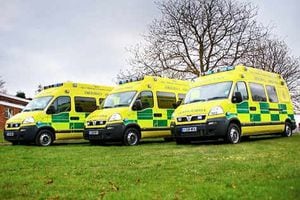Ambulance workers take 19 days off sick
Ambulance workers in the West Midlands took almost four working weeks off sick last year, new figures revealed today.

Ambulance workers in the West Midlands took almost four working weeks off sick last year, new figures revealed today.
At the same time complaints against West Midlands Ambulance Service soared by almost 60 per cent during 2009/10.
The year has been described as one of the most challenging in the organisation's history. During that period the average staff member took 19 days off sick. This works out as a total of 66,464 days for the trust's 4,084 workers, when the number of part-time employees is taken into account.
In total, it means workers lose 6.2 per cent of their annual hours to sickness.
Chief executive Anthony Marsh told a trust board meeting yesterday: "We are absolutely determined to reduce our sickness absence and are on target to reduce the rates to four per cent at the end of this current year.
"It is no higher than other ambulance trusts.
"Our staff undertake very demanding roles, working long hours and shifts in difficult circumstances often outside their control, such as a lorry upside down in a ditch."
A total of 308 formal complaints were made against the ambulance service in 2009/10, compared to 195 for the same period a year earlier.
This represents an increase of 57.9 per cent but bosses say the rise can partly be blamed on the service taking on more work and increased activity.
The vast majority of complaints, more than 200, related to patients feeling dissatisfied with the clinical care provided by paramedics.
Mr Marsh said the service had taken on new contract work for transferring non-emergency patients and that activity for the trust had gone up.
The trust's annual report for the same period also shows 160 ambulance staff were subjected to physical violence while on duty, while 296 more were verbally abused.
The last 12 months were described by ambulance service chairman Sir Graham Meldrum as one of the most "challenging ever."
He said the combination of swine flu, the worst winter for 30 years and a rise in demand had put pressure on ambulance services in the region.





